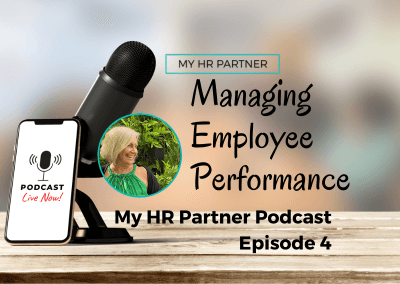Welcome to another episode of the My HR Partner podcast, where we dive deep into all things HR. In this episode, we discuss a crucial aspect of running a successful business – managing employee performance.
The Importance of Managing Performance
Performance management might is a vital function that can significantly impact your business’ success. So, what does performance management entail?
Karen highlights two primary aspects of performance management: addressing poor performance and nurturing employee growth and encouraging great performance.
Dealing with Poor Performance
One side of performance management deals with addressing employees whose performance falls below the expected standards or whose behaviour isn’t aligning with company values. This process can start informally but may escalate to a formal one if necessary.
The goal here isn’t merely to show the door to underperforming employees; it should be more focussed on giving them the opportunity and support to improve. After all, recruiting and training new employees is costly. Ideally, you want to get your existing employees back on track or back to being great contributors to your business and supporting them in getting there.
The Performance Appraisal Process
On the flip side, there’s the performance appraisal process – the more positive aspect of performance management. This is where you reward employees for their hard work and commitment, and work together to set goals, both personal and business goals.
A good performance appraisal process includes both formal and informal components. The formal part might involve periodic sit-down meetings where managers and employees discuss goals, achievements, and areas for improvement. The frequency of these meetings should align with your business’ needs. This could be once a year, every six months or even more frequently, but it needs to be practical.
However, the informal side is equally important. These are the impromptu check-ins, quick chats over coffee, or short walks to discuss progress and address concerns. It’s all about fostering open communication and having that “open door” policy where your team feel really comfortable talking to you about any challenges they are facing.
Getting the Documentation Right
Having a clear and documented performance management system is essential. It ensures consistency and provides employees with a roadmap. This documentation is usually in HR policies and procedures, acting as a reference for both managers and staff.
But what if you don’t have a documented system? Don’t let that deter you from starting the process. Seek advice and begin by setting clear expectations. Implement a performance improvement plan, monitor progress, and provide necessary support.
The Impact on Culture
A well-executed performance management strategy contributes to a positive company culture. When employees see that their efforts are acknowledged, they feel valued and engaged. They’re more likely to share their ideas, ask for help when needed, and actively participate in their own development.
Creating a culture of feedback and support is essential. It encourages employees to voice concerns, seek assistance, and take ownership of their work performance.
In this episode, we’ve explored the critical aspects of managing employee performance, as discussed on the My HR Partner podcast. Whether you’re addressing poor performance or nurturing your team’s growth, having a clear and documented process is key. It not only improves individual performance but also contributes to a thriving company culture.
Managing employee performance is an ongoing process that, when done right, benefits both your employees and your business. Take the initiative to create a positive workplace culture where feedback and support thrive, and you’ll reap the rewards.








